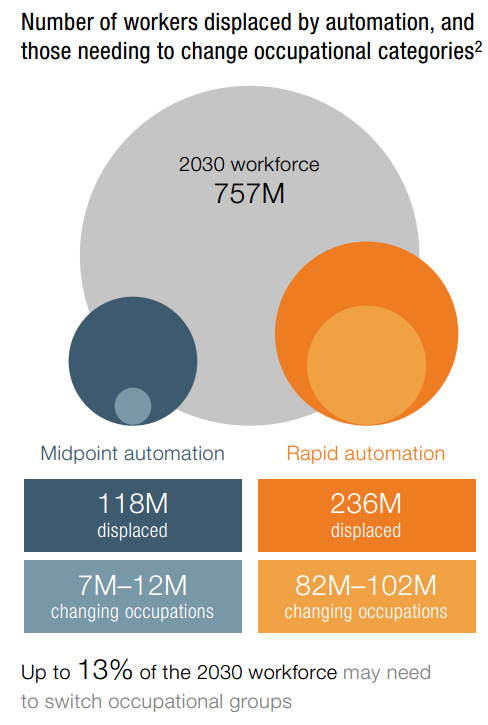Discussions about robots that will take away human jobs are commonplace, but recently McKinsey has provided a startling data: With the rapid development of automation, by 2030, jobs for 800 million people worldwide will be replaced by machines.
In a report released Wednesday, the McKinseyGlobal Institute said that automation technologies, including artificial intelligence and robotics, will bring significant benefits to users, businesses, and the economy, increase productivity and boost economic growth. But the degree to which technology replaces manpower will depend on factors such as technology development, applications, economic growth, and employment growth.
The scope of the study, involving 46 countries, has classified and predicted the impact of varying degrees of automation on employment. With the relative ease of automation, robots will replace 400 million jobs globally by 2030.
The report points out that the potential impact of automation on employment varies by job type and industry sector, and the types of jobs that are most susceptible to automation are those that involve physical activity in predictable environments.
Mechanical operations, fast food preparation, and data collection and processing, for example, will replace a large amount of labor, including mortgage loans, paralegals, accounting, and back office processing.
Jobs that are less affected by automation often involve management, application expertise, and social interactions because the machine's performance in these areas cannot exceed humans.
It is also worth noting that some relatively low-paid jobs in unpredictable environments, such as gardeners, plumbers, children, and elderly care workers, will be less automated, on the one hand, difficult to automate due to their skills. On the other hand, due to the lower wages for such jobs and the relatively high automation costs, the incentive for the automation of such jobs is relatively small.
Automation Does Not Mean Upcoming Era of Unemployment and Employment Changes
In particular, McKinsey pointed out that being replaced by robots does not mean that a large number of people are unemployed, because new jobs will be created and people should improve their job skills to deal with the coming era of great changes in employment.
McKinsey predicts that with the rapid development of automation, 375 million people need to change jobs and learn new skills; while under the relatively modest development of automation, about 75 million people need to change their profession.
Factors that stimulate increased employment include:
Increase in income and consumption. McKinsey expects that between 2015 and 2030, global consumption will increase by 23 trillion US dollars, most of which come from the consumer sectors of emerging economies. The increase in income of the consumer industry alone is expected to create 250 million to 280 million jobs;
The trend of population aging. As people age, consumption patterns will change, and support for medical and other personal services will increase significantly. This will create new demands for a range of occupations including doctors, nurses, and health technicians. McKinsey expects that, by the year 2030, there will be an increase of 50 million to 85 million jobs related to health care for the elderly.
Technology development and application. Between 2015 and 2030, technology-related expenditures are expected to increase by more than 50%, so the demand for work related to technology development is also expected to increase. Half of them are related to information technology services. McKinsey expects that this trend will create 20 to 50 million jobs worldwide by 2030.
In addition, McKinsey pointed out that investments in infrastructure investment and construction, renewable energy, and some types of jobs in the future will also create new job opportunities.
100 million Chinese people face career conversion
From the perspective of population, China will face the largest changes in employment.
The McKinsey report pointed out that in the context of rapid development of automation, by the year 2030, about 100 million people in China will face career transitions, accounting for about 13% of the total employed population.

Of course, this number is not too much compared to the changes in agriculture that have been experienced in China over the past 25 years. McKinsey believes that as income continues to increase, the trend of China's employed population shifting from agriculture to manufacturing and services is expected to continue.
McKinsey predicts that by 2030, 31% of the working time in China will be automated in the context of rapid automation. If development is relatively moderate, this value will drop to 16%.
Pearl Cotton Bag Cutting Machine
Pearl Cotton Bag Cutting Machine,Front Sealing Bag Cutting Machine,High-Speed Bag Cutting Machine,Square Bottom Bag Cutting Machine
Dongguan Yuantong Technology Co., Ltd. , https://www.ytbagmachine.com
